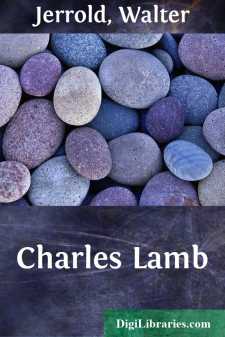Categories
- Antiques & Collectibles 13
- Architecture 36
- Art 48
- Bibles 22
- Biography & Autobiography 813
- Body, Mind & Spirit 142
- Business & Economics 28
- Children's Books 14
- Children's Fiction 11
- Computers 4
- Cooking 94
- Crafts & Hobbies 4
- Drama 346
- Education 46
- Family & Relationships 57
- Fiction 11829
- Games 19
- Gardening 17
- Health & Fitness 34
- History 1377
- House & Home 1
- Humor 147
- Juvenile Fiction 1873
- Juvenile Nonfiction 202
- Language Arts & Disciplines 88
- Law 16
- Literary Collections 686
- Literary Criticism 179
- Mathematics 13
- Medical 41
- Music 40
- Nature 179
- Non-Classifiable 1768
- Performing Arts 7
- Periodicals 1453
- Philosophy 64
- Photography 2
- Poetry 896
- Political Science 203
- Psychology 42
- Reference 154
- Religion 513
- Science 126
- Self-Help 84
- Social Science 81
- Sports & Recreation 34
- Study Aids 3
- Technology & Engineering 59
- Transportation 23
- Travel 463
- True Crime 29
Charles Lamb
by: Walter Jerrold
Categories:
Description:
Excerpt
CHARLES LAMB
THE STORY OF HIS LIFE
Charles Lamb's biography should be read at length in his essays and his letters—from them we get to know not only the facts of his life but almost insensibly we get a knowledge of the man himself such as cannot be conveyed in any brief summary. He is as a friend, a loved friend, whom it seems almost sacrilegious to summarize in the compact sentences of a biographical dictionary, of whom it would be a wrong to write if the writing were to be used instead of, rather than as an introduction to, a literary self-portrait, more striking it may be believed than any of the canvases in the Uffizi Gallery. When he was six-and-twenty Charles Lamb wrote thus in reply to an invitation from Wordsworth to visit him in Cumberland:
I have passed all my days in London ... the lighted shops of the Strand and Fleet Street; the innumerable trades, tradesmen and customers, coaches, waggons, playhouses; all the bustle and wickedness round about Covent Garden; the very women of the town; the watchmen, drunken scenes, rattles; life awake, if you awake, at all hours of the night; the impossibility of being dull in Fleet Street; the crowds, the very dirt and mud, the sun shining upon houses and pavements, the print shops, the old bookstalls, parsons cheapening books, coffee houses, steams of soups from kitchens, the pantomimes—London itself a pantomime and a masquerade—all these things work themselves into my mind, and feed me, without a power of satiating me. The wonder of these sights impels me into night walks about her crowded streets, and I often shed tears in the motley Strand from fulness of joy at so much life. All these emotions must be strange to you; so are your rural emotions to me. But consider, what must I have been doing all my life, not to have lent great portions of my heart with usury to such scenes?
In whimsical exaggeration Lamb sometimes wrote of his aversion from country sights and sounds, adopting that method partly perhaps for the purpose of rallying his correspondents, and partly for the purpose of accentuating his own "unrural notions." He was a Londoner of Londoners. In London he was born and educated, and in London—with a few of his later years in what is now but an outer suburb—he passed the fifty-nine years of his life. Beyond some childish holidays in pleasant Hertfordshire, a few brief trips into the country—to Coleridge at Stowey and at Keswick, to Oxford and Cambridge, and one short journey to Paris—he had no personal contact with the outer world. He delighted in his devotion to London, and stands pre-eminent as the Londoner in literature.
Charles Lamb was the son of John Lamb, who had left his native Lincolnshire—probably from the neighbourhood of Stamford—as a child, and who finally found himself attached to one Samuel Salt, a Bencher of the Inner Temple, in the capacity of "his clerk, his good servant, his dresser, his friend, his 'flapper,' his guide, stop-watch, auditor, treasurer." Salt's chambers were at 2, Crown Office Row, and there John Lamb lived with a family consisting of himself, his wife, an unmarried sister, Sarah Lamb ("Aunt Hetty"), a son John, aged twelve, and a daughter Mary, aged eleven, when on 10th February, 1775, there was born to him another son to whom was given the now familiar name. Seven children had been born from 1762 to 1775, but of them all these three alone survived. The father and his employer are sketched, unforgetably, in Lamb's essay on "The Old Benchers of the Inner Temple," Salt, under his own name, and Lamb under that of Lovel: "I knew this Lovel. He was a man of an incorrigible and losing honesty. A good fellow withal and 'would strike.' In the cause of the oppressed he never considered inequalities, or calculated the number of his opponents." The whole passage must be read in the essay itself. From his father Charles Lamb inherited at once his literary leanings and his humour, both heightened to an incalculable degree. We have Elia's word for it that John Lamb the elder "was the liveliest little fellow breathing" with a face as gay as Garrick's, and we know further that he published a small volume of simple verse....


